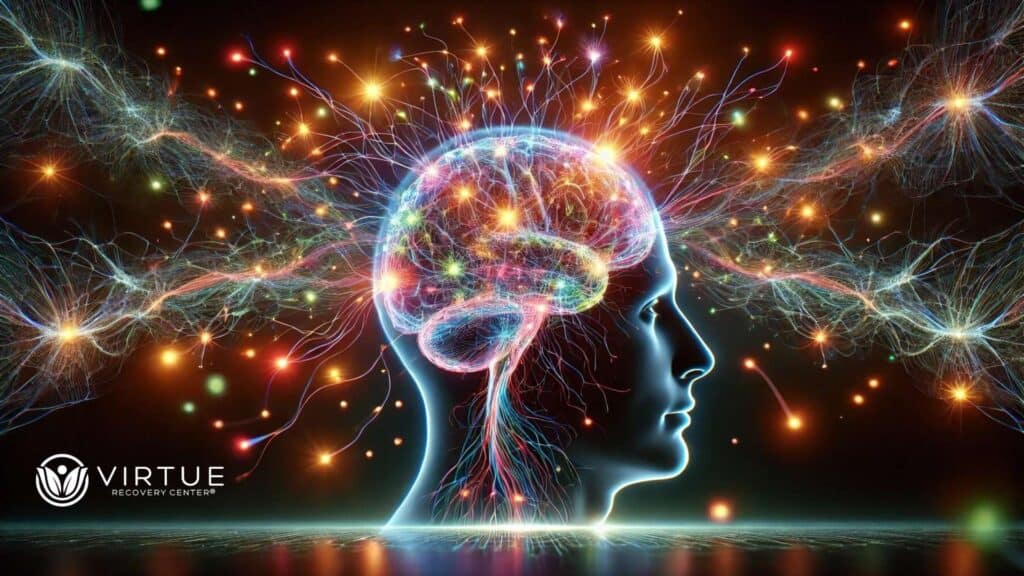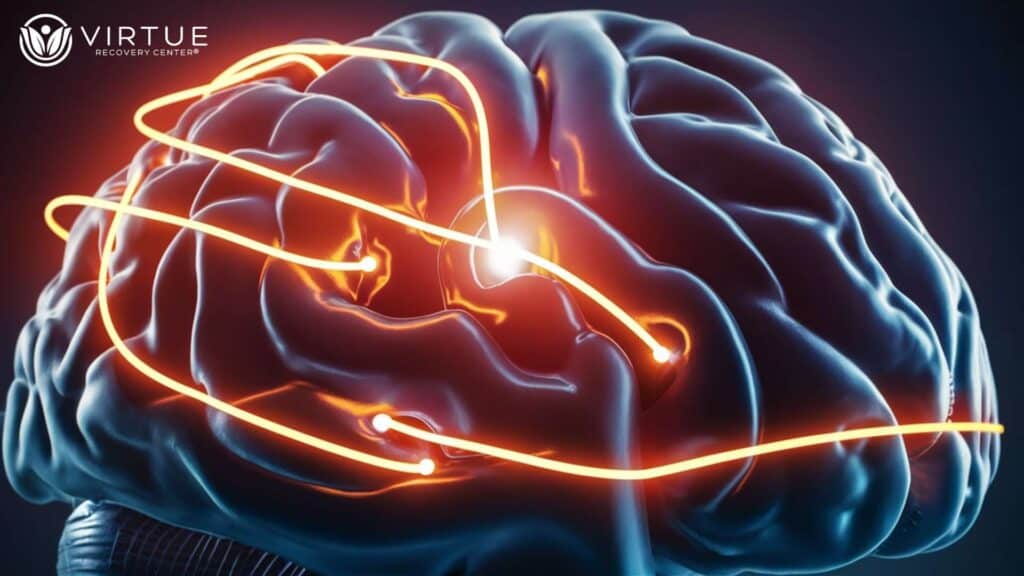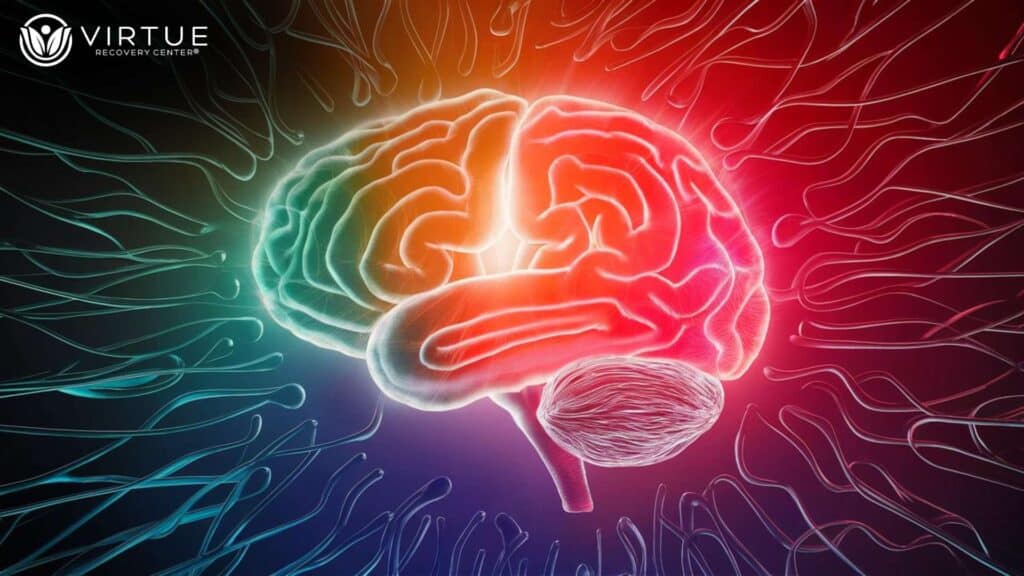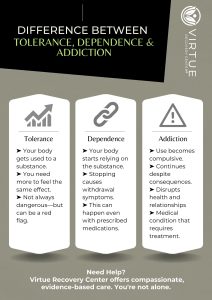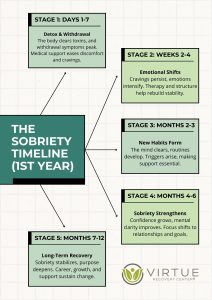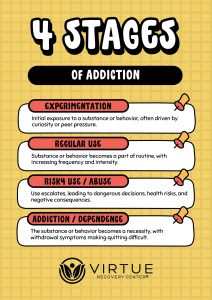Key Takeaways
- Understanding Brain Rewiring from Addiction: Rewiring the brain from addiction involves significant changes in brain chemistry and neural pathways through neuroplasticity.
- Timeframe for Rewiring the Brain: The process varies, typically starting within weeks and continuing over several years, with recovery being a lifelong journey.
- Factors Influencing the Rewiring Process: The type and severity of addiction, individual brain chemistry, duration of substance use, and support systems play crucial roles.
- Effective Treatments and Therapies: Cognitive behavioral therapy (CBT), medication, and comprehensive treatment plans support the brain rewiring process.
- Importance of Long-Term Recovery: Sustaining recovery through ongoing support, healthy lifestyle changes, and recognizing that recovery is a lifelong commitment.
Introduction
Rewiring the brain from addiction is a complex process that involves significant changes in brain chemistry and neural pathways. Understanding how long it takes to rewire the brain from addiction and the factors involved can help those in recovery stay committed to the journey. This article explores the timeframe, effective treatments, and the importance of long-term recovery.
Understanding Brain Rewiring and Neuroplasticity in Addiction Treatment
What is Brain Rewiring?
Brain rewiring refers to the brain’s ability to form new neural connections and pathways, a process known as neuroplasticity. When an individual engages in addictive behaviors, these activities create strong neural pathways that reinforce the addiction. Recovery requires the brain to form new, healthy pathways, replacing those formed by substance use. This process is critical for overcoming addiction and achieving long-term recovery.
Role of Neuroplasticity in Addiction Recovery
Neuroplasticity plays a crucial role in addiction recovery. It allows the brain to adapt and change, forming new neural connections in response to new behaviors and experiences. This ability to rewire is essential for breaking the cycle of addiction and developing healthier habits. The brain’s plasticity means that with the right interventions, individuals can overcome substance abuse and support the rewiring process.
How Addiction Alters Brain Chemistry
Addiction significantly alters brain chemistry, particularly affecting levels of dopamine, a neurotransmitter involved in reward and pleasure. Addictive substances cause a surge in dopamine production, leading to high levels of dopamine and reinforcing the addictive behavior. Over time, the brain’s reward system relies on the substance to produce dopamine, making it difficult to experience pleasure from other activities. Rewiring the brain involves normalizing dopamine levels and restoring brain chemistry balance.
Factors Influencing the Rewiring From Addiction Process
Type and Severity of Addiction
The type and severity of addiction play a significant role in how long it takes to rewire the brain. Different substances impact the brain in various ways, with some causing more profound changes than others. For example, drug addiction to substances like opioids or methamphetamine may take longer to recover from compared to alcohol addiction. The severity of addiction also affects the rewiring process, with more severe cases requiring longer and more intensive interventions.
Individual Differences in Brain Chemistry
Each person’s brain is unique, and individual differences in brain chemistry can influence the rewiring process. Genetics, personal history, and pre-existing mental health conditions all play a role in how quickly and effectively the brain can heal. Personalized treatment plans that consider these individual differences are essential for successful recovery.
Duration of Substance Use
Substance use duration significantly impacts the time required to rewire the brain. Long-term use of addictive substances can cause more extensive changes in brain structure and function, requiring a longer recovery period. Early intervention can help minimize the damage and speed up the brain rewiring process.
Support Systems and Environment
A strong support system and a positive environment are crucial for successful brain rewiring. Family, friends, and community support can provide the encouragement and stability needed for recovery. Conversely, environments with triggers and negative influences can hinder the rewiring process. Removing these triggers and building a supportive network is vital for long-term success.
Timeframe for Rewiring the Brain
Initial Stages of Recovery
The initial stages of recovery typically involve the first few weeks to months. During this period, the brain begins to adjust to the absence of the addictive substance. Withdrawal symptoms can be intense, and immediate changes in brain chemistry occur. Intensive support and treatment are critical during this phase to manage symptoms and prevent relapse.
Short-Term Changes (First Few Months)
The brain adapts in the first few months of recovery, forming new neural connections. Behavioral therapy and cognitive behavioral therapy (CBT) are particularly effective during this period, helping to establish new patterns of thought and behavior. As the brain starts to heal, patients may begin to notice improvements in mood, cognitive function, and overall well-being.
Long-Term Changes (Years of Recovery)
Long-term changes in brain rewiring can take several years. This phase involves continued therapy, medication if needed, and lifestyle changes to support sustained recovery. The brain gradually stabilizes, and the new neural pathways become stronger. Long-term recovery efforts, including ongoing support groups and relapse prevention strategies, are essential to maintain these changes.
Recovery as a Lifelong Process
Recovery is a lifelong journey, and the brain’s ability to adapt continues throughout life. Sustained efforts to maintain a healthy lifestyle, avoid triggers, and seek ongoing support are crucial for preventing relapse and ensuring long-term success. Recognizing that recovery is a lifelong process helps individuals stay committed to their health and well-being.
Effective Treatments and Therapies
Cognitive Behavioral Therapy (CBT)
Cognitive behavioral therapy (CBT) is a cornerstone of addiction treatment. It helps individuals identify and change negative thought patterns and behaviors associated with addiction. CBT supports the brain’s rewiring process by promoting healthy coping mechanisms and reducing the likelihood of relapse.
Behavioral Therapy and Its Impact on the Brain
Other forms of behavioral therapy, such as contingency management and motivational interviewing, are also effective in supporting brain rewiring. These therapies reinforce positive behaviors and help individuals build a structured and supportive environment conducive to recovery.
Role of Medication in Rewiring the Brain
Medications can play a critical role in the brain rewiring process, particularly for those with severe addictions. Medications like naltrexone, methadone, and buprenorphine can help normalize brain chemistry and reduce cravings. Combined with therapy, these medications can significantly enhance the effectiveness of treatment.
Importance of a Comprehensive Treatment Plan
A comprehensive treatment plan that includes therapy, medication, support groups, and lifestyle changes is essential for successful brain rewiring. This holistic approach addresses all aspects of addiction, supporting the brain and body through the recovery process.
Overcoming Withdrawal Symptoms
Understanding Withdrawal and Its Challenges
Withdrawal symptoms are a significant challenge in the early stages of recovery. Symptoms can include anxiety, depression, irritability, and physical discomfort. Understanding these symptoms and their impact on the brain is crucial for managing them effectively.
Managing Withdrawal Symptoms During Recovery
Effective strategies for managing withdrawal symptoms include medical supervision, therapy, and support from family and friends. Medications can also help alleviate some of the symptoms, making the recovery process more manageable.
Strategies to Support Brain Healing
To support brain healing during withdrawal, individuals should focus on maintaining a healthy lifestyle, including proper nutrition, regular exercise, and adequate sleep. Engaging in activities promoting mental well-being, such as mindfulness and meditation, can also aid healing.
Importance of Long-Term Recovery
Sustaining Recovery Through Ongoing Support
Ongoing support is critical for sustaining recovery. This includes participation in support groups, regular therapy sessions, and maintaining a strong network of family and friends. Continuous support helps individuals stay accountable and motivated throughout their recovery journey.
Role of Treatment Centers in Long-Term Recovery
Treatment centers play a vital role in long-term recovery by providing structured programs, medical supervision, and therapeutic support. They offer a safe and supportive environment for individuals to focus on their recovery without the distractions and triggers of everyday life.
Building a Healthy Lifestyle to Support Brain Health
Building and maintaining a healthy lifestyle is essential for supporting brain health and preventing relapse. This includes balanced nutrition, regular physical activity, stress management, and avoiding substances that can harm the brain.
Embracing Recovery as a Lifelong Journey
Embracing recovery as a lifelong journey means recognizing that maintaining sobriety and mental health requires ongoing effort and commitment. By adopting this mindset, individuals can remain proactive in their recovery and continually seek ways to improve their well-being.
Conclusion
Rewiring the brain from addiction is a complex and lengthy process that requires patience, persistence, and a comprehensive approach to treatment. Understanding the timeframe and factors involved can help individuals stay committed to their recovery journey. If you or a loved one is struggling with addiction, contact Virtue Recovery Las Vegas at 866-520-2861 for help. Early intervention and professional assistance can make a significant difference in overcoming addiction and achieving long-term recovery.
FAQs
How long does it take to rewire your brain from addiction?
The time required to rewire the brain from addiction varies but typically involves several months to years, with ongoing recovery efforts needed throughout life.
What are the most effective therapies for brain rewiring?
Cognitive behavioral therapy (CBT) and other behavioral therapies are highly effective in supporting the brain rewiring process during addiction recovery.
Can medication help in the brain rewiring process?
Yes, medications such as naltrexone, methadone, and buprenorphine can help normalize brain chemistry and reduce cravings, supporting the brain rewiring process.
How do withdrawal symptoms impact brain rewiring?
Withdrawal symptoms can be challenging and impact the brain’s ability to heal. Effective management of these symptoms is crucial for successful recovery and brain rewiring.
Where can I find support for addiction recovery?
Virtue Recovery Las Vegas offers comprehensive treatment programs for addiction recovery. Contact us at 866-520-2861 for support and assistance in your recovery journey.
Does addiction rewire the brain?
Yes, addiction rewires the brain by altering the neural pathways associated with reward, motivation, and memory, making it difficult to control substance use and prioritize healthier behaviors.
How long does a dopamine reset take?
The timeframe for a dopamine reset can vary, but it typically takes around 90 days for the brain to restore normal dopamine levels after cessation of addictive substances.
Can you rewire your brain to like something?
Yes, through neuroplasticity, you can rewire your brain to like something by consistently engaging in new behaviors and reinforcing positive experiences associated with the new activity.
Is it possible to rewire your brain to think differently?
It is possible to rewire your brain to think differently through practices such as cognitive-behavioral therapy (CBT), mindfulness, and other techniques that promote new neural connections and healthier thought patterns.
What are the stages of rewiring the brain?
The stages of rewiring the brain include awareness of the need for change, intentional practice of new behaviors, consistency in those behaviors, and reinforcement of the new neural pathways over time.
How long does it take for brain chemicals to rebalance?
It can take several weeks to months for brain chemicals to rebalance after stopping substance use, depending on the substance and the duration of use.
What are the signs of a chemical imbalance in the brain?
Signs of a chemical imbalance in the brain include mood swings, anxiety, depression, fatigue, difficulty concentrating, and changes in appetite or sleep patterns.
Does neuroplasticity aid in addiction?
Yes, neuroplasticity aids in addiction recovery by allowing the brain to form new neural connections, which can help replace addictive behaviors with healthier ones.
How can I accelerate brain rewiring from addiction?
To accelerate brain rewiring from addiction, engage in regular physical exercise, practice mindfulness and meditation, seek therapy such as CBT, maintain a healthy diet, and avoid triggers that can lead to relapse.
How does substance misuse affect the brain’s reward system?
Substance misuse affects the brain’s reward system by overstimulating it, leading to high levels of dopamine production and altering the brain’s natural balance, which can result in dependence and addictive behaviors.
Resources
https://www.ncbi.nlm.nih.gov/pmc/articles/PMC6718472/
https://www.nature.com/articles/522S50a
https://www.yahoo.com/news/alcohol-drugs-rewire-brain-changing-133206398.html

